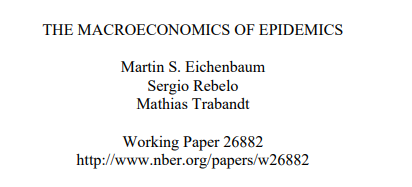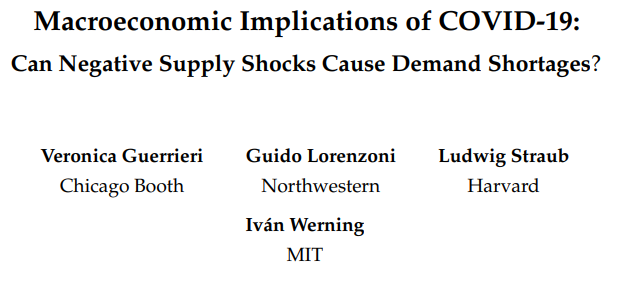ProMarket reviews the most recent and interesting academic papers on the ongoing pandemic: One paper argues that people do not always fully internalize the effect of their decisions on the spread of the virus. Another analyzes the possibility that supply shocks due to the epidemic may affect aggregate demand in magnitude larger than the shocks themselves.
Editor’s note: if you have an economics paper on COVID-19 and would like to have it on ProMarket, please send it to ProMarket@ChicagoBooth.edu with a 500-1000 words summary presenting it to a general audience.
Martin Eichenbaum (Northwestern University), Mathias Traband (Freie Universitat Berlin), and Sergio Rebelo (Northwestern University) extend the canonical epidemiology model to include the interaction between economic decisions and infection rates.
Their work elucidates a timeless economic insight—the welfare losses from unaddressed externalities—in a coronavirus context. Demonstrating that people do not always fully internalize the effect of their decisions on the spread of the virus, they emphasize the large life-saving potential of government-imposed containment policy. By reducing economic interactions, an economic downturn is exacerbated, but welfare increased by reducing the death toll.
They also show that early containment is cheaper since the costs of the externality increase with the number of infections.
Veronica Guerrieri (University of Chicago), Guido Lorenzoni (Northwestern University), Ludwig Straub (Harvard University), and Ivan Werning (MIT) analyze the possibility that supply shocks due to the epidemic may affect aggregate demand in magnitude larger than the shocks themselves.
When some sectors are strongly affected and many people lose their jobs, their decreased demand also affects the less-shock-affected sectors.
In a simple case, demand cannot decrease more than the initial shock, since the decrease in consumption is always a dampened version of the loss in incomes. In an extended model where the economy is comprised of multiple sectors (and incomplete markets), this insight changes.
People in the badly affected sectors who lose their jobs have significantly decreased consumption. The still-employed people must re-allocate resources from commodities no longer available to future consumption (saving) and commodities from other, still available, sectors.
If the option for future consumption is relatively attractive compared to substitution to other-sector commodities, aggregate demand contracts more than supply and jobs in the unaffected sectors falls. As to policy responses, they show demand stimulus is less effective as when the newly unemployed receive direct transfers, none of their spendings will return to this group as income, leaving absent the multiplier effect for those with the highest propensity to consume. Rather, their model suggests policies attenuating the effect of the initial shock—liquidity preventing bankruptcies—are relatively effective.
Joost Sijthoff is a research professional at the Stigler Center, at the University of Chicago – Booth School of Business.
ProMarket is dedicated to discussing how competition tends to be subverted by special interests. The posts represent the opinions of their writers, not necessarily those of the University of Chicago, the Booth School of Business, or its faculty. For more information, please visit ProMarket Blog Policy.








